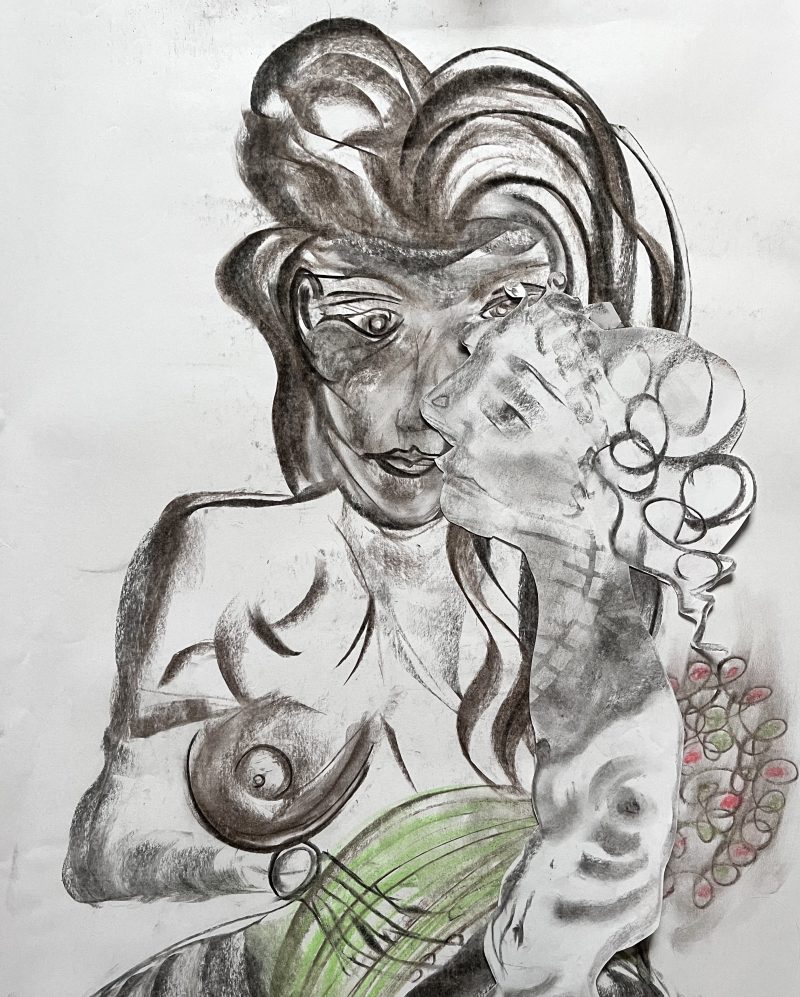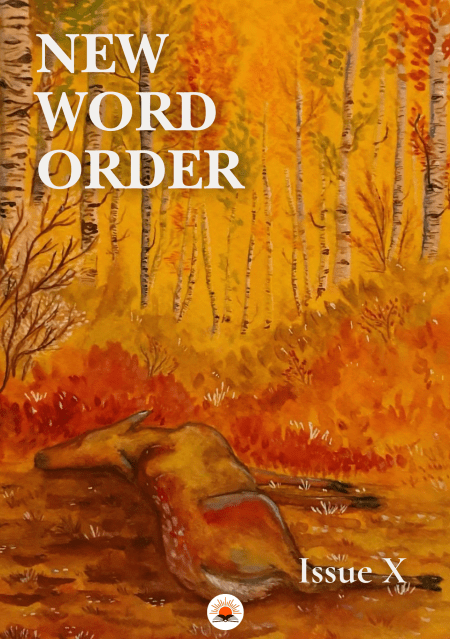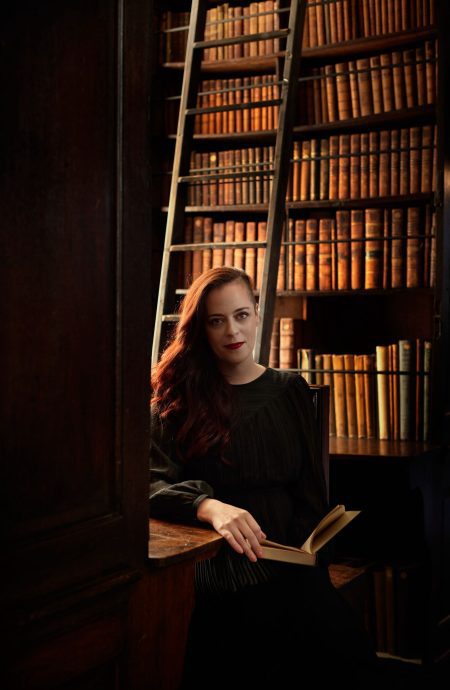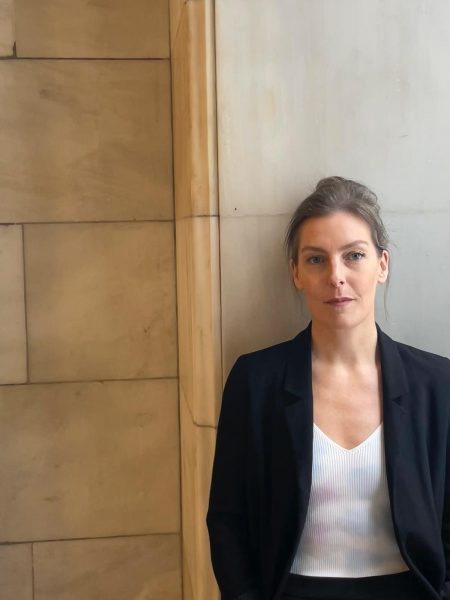By John Higgins
Art By Penny Stuart
The driver grimaces. I stamp down on the back of the buggy, lifting the front two wheels into the air. I shunt it forward, landing the front half on the bus’s elevated platform. Sweat and rain run down my forehead, stinging my eyes. I have no free hand to wipe them.
The bus rumbles. In the wing mirror, I see a distorted version of the queue behind me. Eye rolls. The guy who beckoned me ahead of him is running a hand through his hair, sighing. I want to turn and smile and apologise, but that would mean slowing the process down even more.
I force the buggy up onto the bus and wheel it forward, adjusting its trajectory once I climb on, parking it across the stairs to the upper-deck, hemming someone in.
‘Sorry,’ I say, for what and to who? To the passengers looking to enter or exit while I hold up the show, or to the driver because I don’t have my travel pass to hand?
I plunge my hands into both parka pockets, rummaging amongst the phone, the bulbous dummy, the crumpled shopping list, for that hard-edged piece of plastic, but I can’t find it. I usually have it tucked between two fingers before the bus has even made its approach, but today the bus had been idling at the stop, and the eldest had darted and nudged his way through the crowd and boarded, and the youngest had been getting wet but I hadn’t time to put the rain cover over the front of the buggy, so now here I am, pulling out the pockets of my jeans, shreds of twice-washed toilet paper snow storming the floor.
I turn to the street, searching amongst the legs for any sign of my purse. Nothing. Images of theft leap to mind, that subtle, light touch on the street. Defeated, I turn to call the eldest, who is happily kicking his legs on the back seat of the bus.
In the shopping bags that dangle like ancient testicles from the buggy’s handgrips, the gilded edge of my purse catches my eye. It glimmers under the dusty light. I dive for it, snatching it out.
I unclasp my purse, certain the travel pass will not be in here, dreading the tight-lipped nothing I can do shrug of the driver, but there it is, and I pull it out and tap it off the reader. There is a microsecond of rising panic, insufficient funds blues, but the light goes green, and there’s a slight beep on the driver’s side that is like the jubilant horns of a triumphant army.
I push the buggy down the bus.
***
A sequestered area for buggies and a folding chair speckled with rusk crumbs. There is a smell of damp socks that may be coming from me. The heating is up to the max, and the air is heavy.
The parka is a sweat box. I consider taking it off, but any number of things could happen between unzipping and successfully shrugging it off: the buggy could roll out the door of the bus, there could be a crash, the eldest could be snatched. It’s easier to leave it on.
I’ve just settled when the youngest child begins to cry. It is a piercing wail with no build-up, no growth, it just bursts into life. Sometimes, I think he is always crying, but someone adjusts the volume intermittently. A constant crescendo, a perpetual state of agitation. In certain places, it is enough to gently sssh the child, even if those attempts are unsuccessful. Once everyone knows the parent is making an effort to alleviate the screeching, the stares soften: on trains, where one can take a bathroom break, or on planes, where complimentary earphones can be plugged in, or public spaces, where all one has to do is walk away, far away from the caterwauling.
The discomfort idiosyncratic to the bus is far too intense for me to assuage with mere sibilance: as they have decided to hate me, to acknowledge my feeble efforts at pacification would remind them I am a human being.
I am not innocent in this. The teenager blaring music from the back of the bus, the shouted phone call, the drunk hacking and coughing and spitting. I too have joined in the silent hate, a silence perpetuated by fear. Fear of the quick apology, the conciliatory tone that humanises, that leaves one ashamed of oneself.
The eldest and I used to visit the library after school. He would flick through picture books in the children’s corner. Now, with the youngest always in the buggy, shrieking, his damp nappy ballooning, we must go straight from the school to the shops to the bus to home. The library is out of bounds.
After having children, the world becomes an unforgiving environment. Sometimes I wonder would it be better to never procreate, to never impose the limitations that come with motherhood on yourself? Then I think, no, because it is too late for me to entertain such unbearable thoughts.
***
I haven’t fed the youngest in hours, haven’t had the chance. No wonder it’s wailing, the plentiful spigot of milk withheld for reasons it cannot possibly fathom. It is time to feed.
Only men find breasts attractive. For them, it is something to latch onto during sex, an unconscious reminder of a simpler time.
For women, breasts are unwieldy. Hairs sprout and must be tweezed to get that page-3 hairlessness. They are lacking in value for the trouble they are. I unstrap the child, pulling it out, the blanket dropping onto the floor.
I pull at my parka zipper, gliding it down the metal teeth. I roll up my top. My breast flops out, a clownish word perfect for describing excess or misplaced fat, or the limp penis.
Covering the breast with a hand, I slide the nipple into the youngest’s mouth. His toothless gums clench, my spine spasms with momentary pain. The bus rolls on. I look out the window, my reflection gazing back; with every greedy suck, my reflection becomes paler.
The youngest drains me and is full. It is difficult to detach it from the breast while simultaneously covering it. No one says anything about the brief moment my breast is exposed. No one needs to say anything. The shame is already painted on my face, is apparent in every jerky movement.
I wind the child, then strap him back into the buggy.
***
The bus stops, doors hiss open, handbags and backpacks and newspapers take up free seats as the secondary school kids burst on, the merging of their shouts an indecipherable buzz.
They filter into free space like sand. One stands beside me. He turns this way and that way, his schoolbag grazing me with every spin. He is not just ignoring me. To ignore implies even a cursory register of presence. I simply am not here.
The bus pulls out, heaving under the mixed temporal weight; the future and the past present in the youthfulness of this laugh, the greyness of that face, the smell of chewing-gum, stale cigarette smoke, car oil, cheap perfume.
I turn to check if the eldest is alright. With the older kids on, he is staring into his lap. I want to call him to me, a fear of the black blazer brigade prompting me into action; the same fear paralysing me, keeping me sitting quietly, one hand steadying the buggy.
The schoolboy, because that is all he is despite his foulmouthed efforts to the contrary, takes advantage of being waist-high with my face. His pissy crotch comes flying towards me, three rapid jerks that I am powerless to reject. An aggressive simulacrum of oral sex. I must just sit, take it, accept that it is happening, has happened, all the while sniggers surround me, penetrating the wall of disapproving silence.
Most of the school kids get off in a few stops’ time. The kids leave in twos, threes, fours, stepping from the tilted precipice of the bus onto the slick, wet pavement.
***
I hear the eldest calling to me, and I flush red, wondering what the other passengers think of my lack of surveillance, the neglect it must be symptomatic of. He staggers down the bus, going from handrail to handrail, monkey bar-style.
He has taken it into his head that he wants to get his homework done before the bus journey is over. I tell him no, because we are three stops from home, which is the only way to calculate the duration of these sputtering journeys. Three stops, that is all, but he insists, he wants to start his homework because it means more TV time, which I try to limit but cannot bring myself to, the flickering cartoon images as much a panacea for me as they are a stimulant to him. His Thomas the Tank Engine schoolbag is wedged into the basket’s undercarriage; balanced precariously on top of it is another full shopping bag.
It is a conversation that rises from a whisper to a hiss as his protestations become louder, more intense. A whininess creeps into his voice that I hope for his sake he loses. Beneath the bus rumbling, the clipped tones of the stop announcer, the occasional beep from ahead of or behind us, the tinny din of techno bleeding out of earphones, beneath all this is silent judgment. It is a tense moment, a moment in which I am torn between capitulating to my son’s demands, or keeping my word to myself. Both are equally unattractive options: lose the esteem of strangers or the respect of my child; however, it is impossible to tell which response leads to which outcome.
His implorations continue, growing louder and louder, his body pressing against me, entering the air which had previously been violated by the starchy crotch of charcoal school trousers, confining me, leaving me no escape, trapped within my parka, trapped between the window and my son on a bus trundling through school-run traffic.
He does not back off, instead moving his hand off my sleeve and reaching into the buggy. I repeat, no, we are nearly there, two stops left now, the bus gaining speed, moving from an idle rumble to a climax of vibrations, the rain racing down the glass, the off-licenses and the black hearts of inert kebab-shop signs merging. He just won’t listen, he insists. He pulls the shopping bag out, holding it by one thin strap.
The bus splashes into a pothole, the bag flies from the eldest’s hand: oranges, peppers, pita bread, Fruit Shoots, all skittering beneath seats and rolling down towards the driver’s cab. The youngest begins to cry.
The eldest steps on the empty bag, the plastic rustling, and he reaches for his blue schoolbag, and it’s no, no, but he won’t listen, the bag being teased out of the basket, and there is for me a moment of blackness, interrupted by a whipcrack that reverberates through the bus, the midnight settle of an old house that sets your heart hammering.
The eldest snatches his hand away and announces what I have done, speaking to me but, of course, addressing everyone else. Finally, the whispers begin, the raised-eyebrow semaphore. The eldest looks at the back of his hand in disbelief, that milk-whiteness sullied with the redness of sudden contact; he shows it to me, holding out the evidence of my crime.
The bus is approaching our stop. I face front, scanning the sticker that insists we do not speak to the driver while the bus is moving, feeling eyes burrowing into the back of my skull, and our stop is there now, I see it through the capacious front window, our house blurry with rain and tears.
John Higgins
John Higgins is an Irish writer. His work has been featured in Crannog, The Blue Nib, Honest Ulsterman, and more. He has been shortlisted for the Scribble Short Fiction Prize and the Mairtin Crawford Short Story Award.



